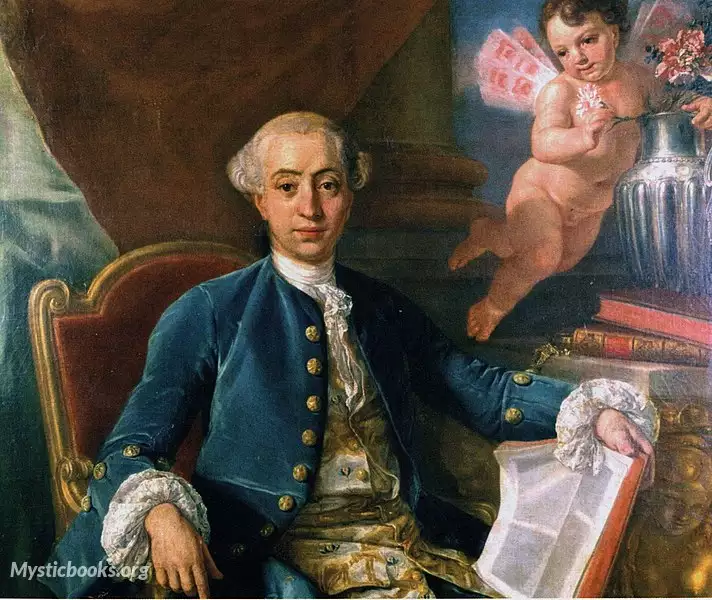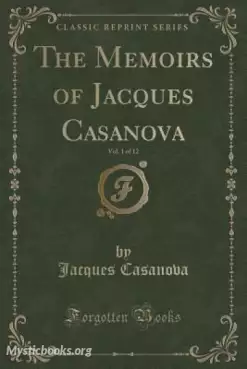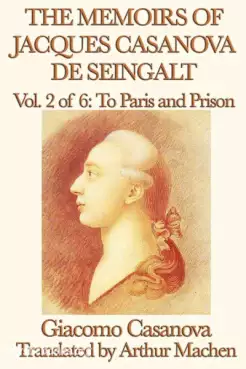
Timeline
Title
Country/Nationality
Giacomo Casanova
Giacomo Girolamo was an Italian adventurer and author from the Republic of Venice. His autobiography is regarded as one of the most authentic sources of the customs and norms of European social life during the 18th century.
As was not uncommon at the time, Casanova, depending on circumstances, used more or less fictitious names, such as baron or count of Farussi (the maiden name of his mother) or Chevalier de Seingalt .He often signed his works Jacques Casanova de Seingalt after he began writing in French following his second exile from Venice.
Giacomo Girolamo Casanova was born in Venice in 1725 to actress Zanetta Farussi, wife of actor and dancer Gaetano Casanova. Giacomo was the first of six children, being followed by Francesco Giuseppe (1727–1803), Giovanni Battista (1730–1795), Faustina Maddalena (1731–1736), Maria Maddalena Antonia Stella (1732–1800), and Gaetano Alvise (1734–1783).
At the time of Casanova's birth, the city of Venice thrived as the pleasure capital of Europe, ruled by political and religious conservatives who tolerated social vices and encouraged tourism. It was a required stop on the Grand Tour, traveled by young men coming of age, especially men from the Kingdom of Great Britain. The famed Carnival, gambling houses, and beautiful courtesans were powerful drawing cards. This was the milieu that bred Casanova and made him its most famous and representative citizen.
Scandals tainted Casanova's short church career. After his grandmother's death, Casanova entered a seminary for a short while, but soon his indebtedness landed him in prison for the first time. An attempt by his mother to secure him a position with Bishop Bernardo de Bernardis was rejected by Casanova after a very brief trial of conditions in the bishop's Calabrian see. Instead, he found employment as a scribe with the powerful Cardinal Acquaviva in Rome. On meeting the pope, Casanova boldly asked for a dispensation to read the "forbidden books" and from eating fish (which he claimed inflamed his eyes). He also composed love letters for another cardinal. When Casanova became the scapegoat for a scandal involving a local pair of star-crossed lovers, Cardinal Acquaviva dismissed Casanova, thanking him for his sacrifice, but effectively ending his church career.
Crestfallen and despondent, Casanova returned to Venice, and after a good gambling streak, he recovered and set off on a grand tour, reaching Paris in 1750. Along the way, from one town to another, he got into sexual escapades resembling operatic plots. In Lyon, he entered the society of Freemasonry, which appealed to his interest in secret rites and which, for the most part, attracted men of intellect and influence who proved useful in his life, providing valuable contacts and uncensored knowledge. Casanova was also attracted to Rosicrucianism. In Lyons, Casanova became companion and finally took the highest degree of Scottish Rite Master Mason.
On 26 July 1755, at age 30, Casanova was arrested for affront to religion and common decency: The Tribunal, having taken cognizance of the grave faults committed by G. Casanova primarily in public outrages against the holy religion, their Excellencies have caused him to be arrested and imprisoned under the Leads.The Leads" was a prison of seven cells on the top floor of the east wing of the Doge's palace, reserved for prisoners of higher status as well as certain types of offenders—such as political prisoners, defrocked or libertine priests or monks, and usurers—and named for the lead plates covering the palace roof. The following 12 September, without a trial and without being informed of the reasons for his arrest and of the sentence, he was sentenced to five years imprisonment.
He was placed in solitary confinement with clothing, a pallet bed, table, and armchair in "the worst of all the cells", where he suffered greatly from the darkness, summer heat, and "millions of fleas". He was soon housed with a series of cellmates, and after five months and a personal appeal from Count Bragadin, was given warm winter bedding and a monthly stipend for books and better food. During exercise walks he was granted in the prison garret, he found a piece of black marble and an iron bar which he smuggled back to his cell; he hid the bar inside his armchair. When he was temporarily without cellmates, he spent two weeks sharpening the bar into a spike on the stone. Then he began to gouge through the wooden floor underneath his bed, knowing that his cell was directly above the Inquisitor's chamber.Just three days before his intended escape, during a festival when no officials would be in the chamber below, Casanova was moved to a larger, lighter cell with a view, despite his protests that he was perfectly happy where he was. In his new cell, "I sat in my armchair like a man in a stupor; motionless as a statue, I saw that I had wasted all the efforts I had made, and I could not repent of them. I felt that I had nothing to hope for, and the only relief left to me was not to think of the future."
Overcoming his inertia, Casanova set upon another escape plan. He solicited the help of the prisoner in the adjacent cell, Father Balbi, a renegade priest. The spike, carried to the new cell inside the armchair, was passed to the priest in a folio Bible carried under a heaping plate of pasta by the hoodwinked jailer. The priest made a hole in his ceiling, climbed across and made a hole in the ceiling of Casanova's cell. To neutralize his new cellmate, who was a spy, Casanova played on his superstitions and terrorized him into silence. When Balbi broke through to Casanova's cell, Casanova lifted himself through the ceiling, leaving behind a note that quoted the 117th Psalm (Vulgate): "I shall not die, but live, and declare the works of the Lord".
The spy remained behind, too frightened of the consequences if he were caught escaping with the others. Casanova and Balbi pried their way through the lead plates and onto the sloping roof of the Doge's Palace, with a heavy fog swirling. The drop to the nearby canal being too great, Casanova prised open the grate over a dormer window, and broke the window to gain entry. They found a long ladder on the roof, and with the additional use of a bedsheet "rope" that Casanova had prepared, lowered themselves into the room whose floor was 25 feet below. They rested until morning, changed clothes, then broke a small lock on an exit door and passed into a palace corridor, through galleries and chambers, and down stairs, where, by convincing the guard they had inadvertently been locked into the palace after an official function, they left through a final door. It was 6:00 in the morning and they escaped by gondola. Eventually, Casanova reached Paris, where he arrived on the same day (5 January 1757) that Robert-François Damiens made an attempt on the life of Louis XV.
Books by Giacomo Casanova

The Memoirs of Jacques Casanova, Vol. 1
This is the first of five volumes. - Giacomo Casanova (1725 in Venice – 1798 in Dux, Bohemia, now Duchcov, Czech Republic) was a famous Venetian adventurer, writer, and womanizer. He used charm, guile, threats, intimidation, and aggression, when nece...

The Memoirs of Jacques Casanova, Vol. 2
Histoire de ma vie (History of My Life) is both the memoir and autobiography of Giacomo Casanova, a famous 18th-century Italian adventurer. A previous, bowdlerized version was originally known in English as The Memoirs of Jacques Casanova (from the F...